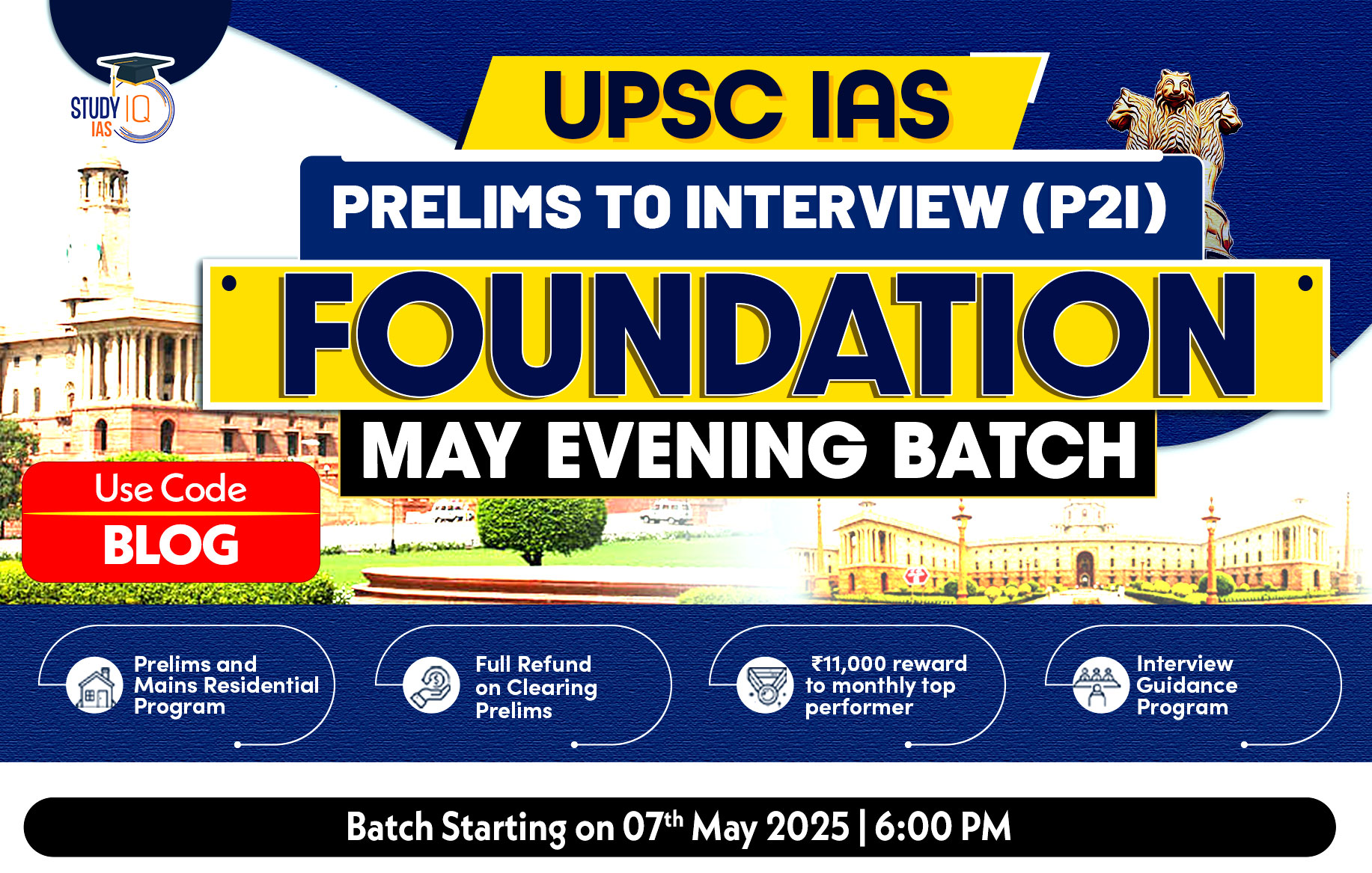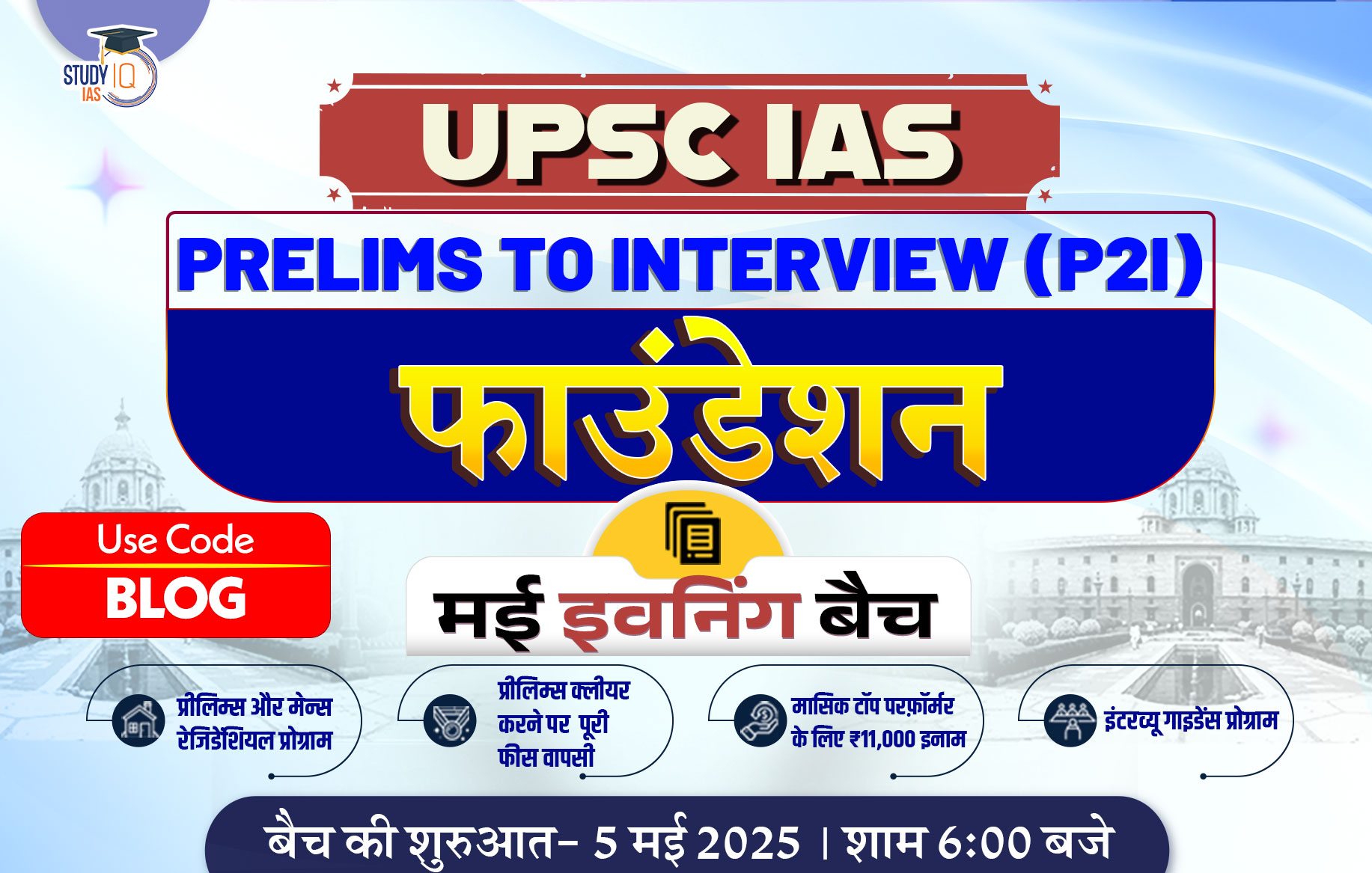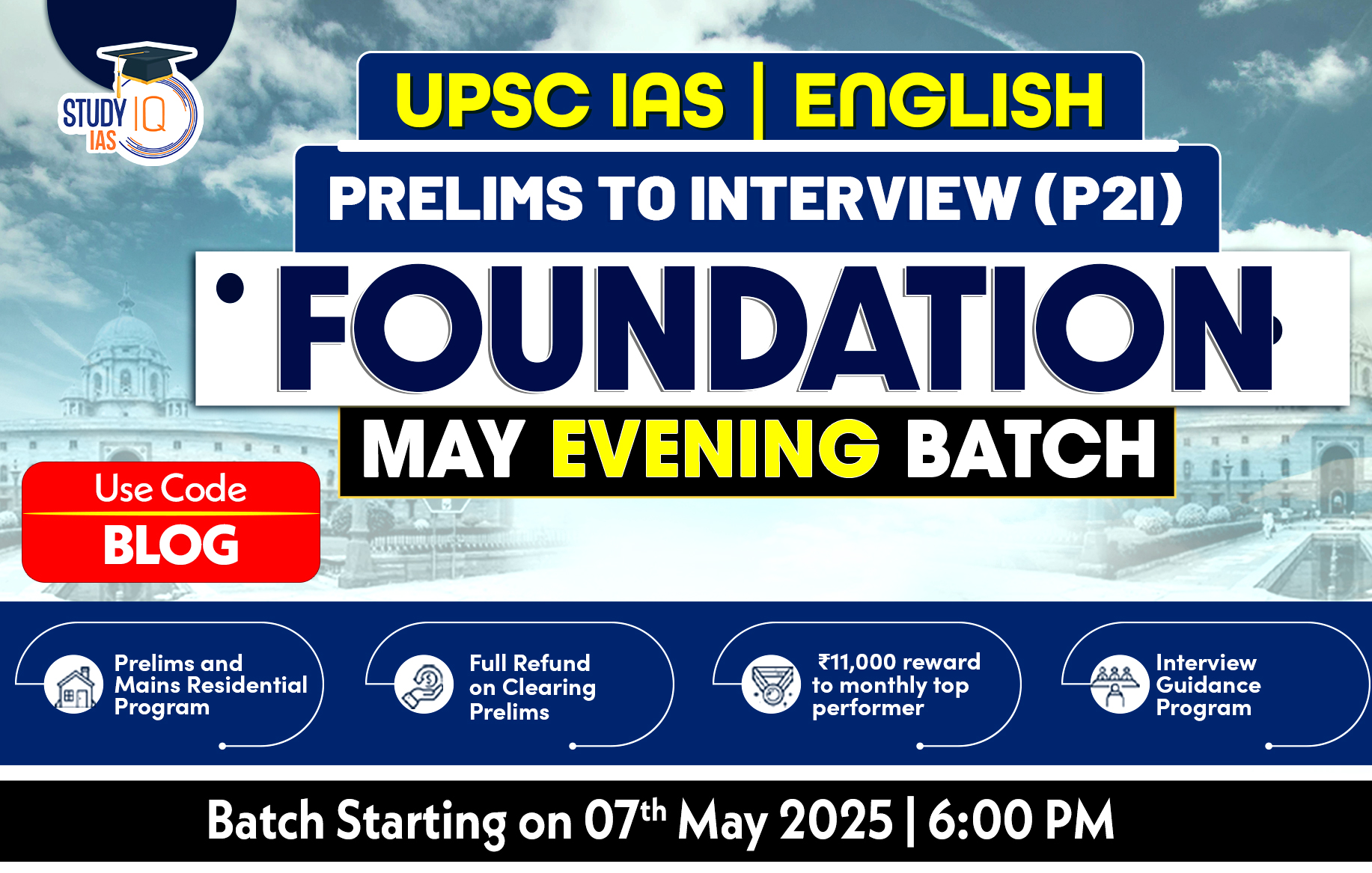The Hindu Newspaper Analysis for UPSC
- Iran has scrapped its morality police after more than two months of protests triggered by the death of Mahsa Amini following her arrest for allegedly violating the country’s strict dress code for women, local media said on Sunday.
- Women-led protests, labelled “riots” by the authorities, have swept Iran since the 22-year-old Iranian of Kurdish origin died on September 16, three days after her arrest by the morality police in Tehran.
About Moral Policing
- It is a kind of a social as well as a political act which coercively imposes cultural values upon the people of our society without their consent.
- Healthy soils are essential for our survival. They support healthy plant growth to enhance both our nutrition and water percolation to maintain groundwater levels. Soils help to regulate the planet’s climate by storing carbon and are the second largest carbon sink after the oceans. They help maintain a landscape that is more resilient to the impacts of droughts and floods. As soil is the basis of food systems, it is no surprise that soil health is critical for healthy food production.
- World Soil Day (WSD) 2022, annually observed on December 5, aligns with this.
- The main drivers contributing to soil degradation are industrial activities, mining, waste treatment, agriculture, fossil fuel extraction and processing and transport emissions. The reasons behind soil nutrient loss range from soil erosion, runoff, leaching and the burning of crop residues.
- The Government of India is implementing a five-pronged strategy for soil conservation. This includes making soil chemical-free, saving soil biodiversity, enhancing SOM, maintaining soil moisture, mitigating soil degradation and preventing soil erosion.
- the National Mission for Sustainable Agriculture (NMSA) has schemes promoting traditional indigenous practices such as organic farming and natural farming, thereby reducing dependency on chemicals and other agri-inputs, and decreasing the monetary burden on smallholder farmers.
- In a report titled ‘How COVID-19 restrictions affected religious groups around the world in 2020,’ compiled by the Pew Research Center, India has been ranked first in the Social Hostilities Index (SHI) which measures acts of religious hostility by private individuals, organisations or groups in society. The higher the rank, the higher the hostility. This index includes religion-related armed conflict or terrorism, mob or sectarian violence, harassment over attire for religious reasons, and other forms of religion-related intimidation or abuse.
- The SHI uses 13 indicators to measure social hostilities. This was the 13th edition of the Pew survey, which started in 2007.
- India ranked relatively low (33 out of 198 countries) in the Government Restrictions Index (GRI) which measures government laws, policies and actions that restrict religious beliefs and practices. The higher the rank, the higher the restrictions.
- Afghanistan requires Indian investment, a representative of the Taliban told The Hindu on Sunday. Taliban’s head of political office Suhail Shaheen said a Taliban delegation had met the head of mission of the Indian Embassy in Kabul and invited its teams to help build and sustain infrastructure projects in the country.
- “Afghanistan is open for Indian investment including urban infrastructure. This is the message that the Afghan Minister of Urban Development communicated in a recent meeting with the Indian Charge d’Affaires in Kabul,” said Shaheen adding that the Taliban’s Minister of Urban Development Hamdullah Nomani and the Indian Charge d’Affaires Bharat Kumar held discussions on investment and various projects.
- SALMA DAM: The 42MW Salma Dam in Herat province. The hydropower and irrigation project, completed against many odds and inaugurated in 2016, is known as the Afghan-India Friendship Dam.
- ZARANJ-DELARAM HIGHWAY: The other high-profile project was the 218-km Zaranj-Delaram highway built by the Border Roads Organisation. Zaranj is located close to Afghanistan’s border with Iran. The $150-million highway goes along the Khash Rud river to Delaram to the northeast of Zaranj.
- PARLIAMENT: The Afghan Parliament in Kabul was built by India at $90 million. It was opened in 2015; Prime Minister Narendra Modi inaugurated the building.
- STOR PALACE: In 2016, Afghan President Ashraf Ghani and Prime Minister Modi inaugurated the restored Stor Palace in Kabul, originally built in the late 19th century, and which was the setting for the 1919 Rawalpindi Agreement by which Afghanistan became an independent country.
- Confined to the digital world due to COVID-19 restrictions over the past two years, traffickers are scouring online classrooms, gaming platforms, matrimonial sites, dating apps, chat apps and even loan apps for potential victims.
- In the small towns and villages of India — especially in States which are already known as hotbeds of trafficking such as Rajasthan, West Bengal, Jharkhand and Madhya Pradesh — women and children are being abused, blackmailed and trafficked using Web applications.
- A study on changing trends in online abuse and trafficking of women and children done in these four States shows that 44% of the respondents started using the Internet only after the outbreak of COVID-19. It also found that 98% of the respondents use cheaper devices such as smartphones to access the Internet. 51% use it for school or college work, more than 56% for social media, almost 42% for e-commerce and 35% for online gaming.
What are the constitutional & legislative provisions related to Trafficking in India?
- Trafficking in Human Beings or Persons is prohibited under the Constitution of India under Article 23 (1).
- The Immoral Traffic (Prevention) Act, 1956 (ITPA) is the premier legislation for prevention of trafficking for commercial sexual exploitation.
- Criminal Law (amendment) Act 2013 has come into force wherein Section 370 of the Indian Penal Code has been substituted with Section 370 and 370A IPC which provide for comprehensive measures to counter the menace of human trafficking.
- India has jumped to the 48th position in the global aviation safety ranking by the International Civil Aviation Organization (ICAO), according to DGCA officials. Four years ago, the country was ranked at the 102nd position.
- Now that India has earned a slot among the top 50, it ranks above China (49), Israel (50), Turkey (54), Denmark (55) and Poland (60).
- Under its Universal Safety Oversight Audit Programme (USOAP) Continuous Monitoring Approach, an ICAO Coordinated Validation Mission (ICVM) was undertaken from November 9 to 16.
- On November 21, China’s top development aid agency convened a first “China-Indian Ocean Region Forum” in the city of Kunming. The forum underlines Beijing’s growing strategic interests in a region where its economic footprint has been deepening.
- The organisers have said the forum was attended by “high-level representatives” and “senior officials” from 19 countries. But two of these countries, Australia and Maldives, released statements rebutting the claim, emphasising that they did not participate officially.
- New Delhi has viewed China’s recent moves in the Indian Ocean region warily, including the recent visit of a Chinese military tracking vessel, the Yuan Wang 5, to Sri Lanka. Moreover, India sees the IORA as an already established platform for the region.
- The Indian Ocean Rim Association (IORA) is an inter-governmental organisation formed in 1997 to foster regional economic cooperation. IORA has evolved into the peak regional group spanning the Indian Ocean.
- From its inception with 14 member states, the membership has expanded to 23 countries: Australia, Bangladesh, the Comoros, France, India, Indonesia, Iran, Kenya, Madagascar, Malaysia, Maldives, Mauritius, Mozambique, Oman, Seychelles, Singapore, Somalia, South Africa, Sri Lanka, Tanzania, Thailand, the United Arab Emirates and Yemen. IORA has 10 dialogue partners: China, Egypt, Germany, Italy, Japan, Russia, Turkey, the Republic of Korea, the United Kingdom and the United States of America.
- The digital rupee, or the e-rupee, is a central bank digital currency issued by the RBI. It is similar to the physical cash that you hold in your wallet except that the e-rupee is held electronically in a digital wallet overseen by the RBI. The digital rupee is recognised as legal tender by the RBI, and thus has to be accepted by everyone in the country as a medium of exchange.
- It is, however, different from deposits that you hold in a bank. Unlike deposits which are paid interest, the digital rupees in your wallet are not paid any interest by the central bank. Deposits held in banks can be converted into digital rupees and vice-versa.
- The RBI believes that the digital rupee will make the rupee more attractive as a currency to users when compared to cryptocurrencies. Cryptocurrencies have been viewed by many investors as alternatives to fiat currencies which progressively lose value over time due to debasement by central banks.
Q) With reference to the Swar Dharohar Festival, consider the following statements:
- It is organised by NITI Aayog.
- The festival aims at showcasing the iconic art, culture and heritage of the country.
Which of the above statements is/are correct?
- 1 only
- 2 only
- Both 1 and 2
- Neither 1 nor 2
स्वर धरोहर महोत्सव के संदर्भ में निम्नलिखित कथनों पर विचार कीजिये:
- इसका आयोजन नीति आयोग द्वारा किया जाता है।
- त्योहार का उद्देश्य देश की प्रतिष्ठित कला, संस्कृति और विरासत को प्रदर्शित करना है।
उपरोक्त कथनों में से कौन-सा/से सही है/हैं?
- केवल 1
- केवल 2
- 1 और 2 दोनों
- न तो 1 और न ही 2
Explanation :
Union Culture Ministry recently inaugurated a three-day long music, art and literature festival Swar Dharohar in New Delhi.
- The festival aims at showcasing the iconic art, culture and heritage of the country.
- It is organised by Ministry of Culture, Government of India in collaboration with “Swar Dharohar Foundation.
- The program will facilitate the upcoming local artists to perform with renowned artists on the same platform.
- The national, as well as local poets, will also exhibit their artistry through Kavi Sammelan.
Q) With reference to the PM Daksh Program, consider the following statements:
- It was launched by the Ministry of Home Affairs in 2020-21.
- It is a National Action Plan for skilling marginalized persons covering SCs, OBCs, EBCs, DNTs, Sanitation workers including waste pickers.
Which of the above statements is/are correct?
- 1 only
- 2 only
- Both 1 and 2
- Neither 1 nor 2
पीएम दक्ष कार्यक्रम के संदर्भ में निम्नलिखित कथनों पर विचार कीजिये:
- इसे गृह मंत्रालय द्वारा 2020-21 में लॉन्च किया गया था।
- यह कूड़ा बीनने वालों सहित अनुसूचित जाति, अन्य पिछड़ा वर्ग, ईबीसी, डीएनटी, स्वच्छता कार्यकर्ताओं को कवर करने वाले हाशिए पर पड़े व्यक्तियों को कुशल बनाने के लिए एक राष्ट्रीय कार्य योजना है।
उपरोक्त कथनों में से कौन-सा/से सही है/हैं?
- केवल 1
- केवल 2
- 1 और 2 दोनों
- न तो 1 और न ही 2
Explanation :
According to the Union Ministry of Social Justice and Empowerment about 5 lakh people got benefits under PM Daksh Program.
- PM-DAKSH (Pradhan Mantri Dakshta Aur Kushalta Sampann Hitgrahi) Yojana was launched by the Ministry of Social Justice & Empowerment (MoSJ&E) in 2020-21.
- It is a National Action Plan for skilling marginalized persons covering SCs, OBCs, EBCs, DNTs, Sanitation workers including waste pickers.
Objective:
- The main objective of the PM-DAKSH Yojana is to increase the skill levels of the target youth by providing them short term and long term skills, followed by assistance in wage/self-employment.
Q) International Day of Persons with Disabilities is being observed on:
- December 3
- December 13
- December 20
- December 8
विकलांग व्यक्तियों का अंतर्राष्ट्रीय दिवस मनाया जाता है:
- 3 दिसंबर
- 13 दिसंबर
- 20 दिसंबर
- 8 दिसंबर
Explanation :
International Day of Persons with Disabilities is being observed on December 3, 2022.
- International Day of People with Disabilities (IDPWD) is a United Nations sanctioned day celebrated internationally on 3 December each year.
- The annual observance of the International Day of Disabled Persons was proclaimed in 1992 by United Nations General Assembly resolution 47/3.
- Its objective is to promote the rights and well-being of persons with disabilities in all spheres of society and development and to increase awareness.
Q) Consider the following statements:
- Meghalaya was carved out of West Bengal.
- Meghalaya became a full-fledged state in 1972.
Which of the above statements is/are correct?
- 1 only
- 2 only
- Both 1 and 2
- Neither 1 nor 2
निम्नलिखित कथनों पर विचार करें:
- मेघालय को पश्चिम बंगाल से अलग कर बनाया गया था।
- मेघालय 1972 में एक पूर्ण राज्य बना।
उपरोक्त कथनों में से कौन-सा/से सही है/हैं?
- केवल 1
- केवल 2
- 1 और 2 दोनों
- न तो 1 और न ही 2
Explanation:
- Meghalaya was carved out of Assam & became a full-fledged state in 1972. They share 884 km of border. 12 points of dispute between the two states emerged when Meghalaya refused to accept the Assam Reorganization (Meghalaya) Act of 1969. Out of the 12, border disputes along six sectors have been partially resolved last year (2021).
Q) Recently, which one of the following has published its first State of Global Water Resources report?
- UN-Water
- WMO
- WWF
- UNEP
हाल ही में, निम्नलिखित में से किसने अपनी पहली वैश्विक जल संसाधन रिपोर्ट प्रकाशित की है?
- यूएन-वाटर
- डब्लूएमओ
- डब्ल्यूडब्ल्यूएफ
- यूएनईपी
Explanation:
- The World Meteorological Organization has published its first State of Global Water Resources report in order to assess the effects of climate, environmental and societal change on the Earth’s water resources.
- The recent UN climate change conference, COP27, urged governments to further integrate water into adaptation efforts, the first-time Water has been referred to in a COP outcome document in recognition of its critical importance.
Mains Practice Question:
Q) “Ethics is knowing the difference between what you have the right to do and what is right to do. “Explain (150 words)
“नैतिकता यह जानना है कि आपके पास क्या करने का अधिकार है और क्या करने का अधिकार है।” समझाएं


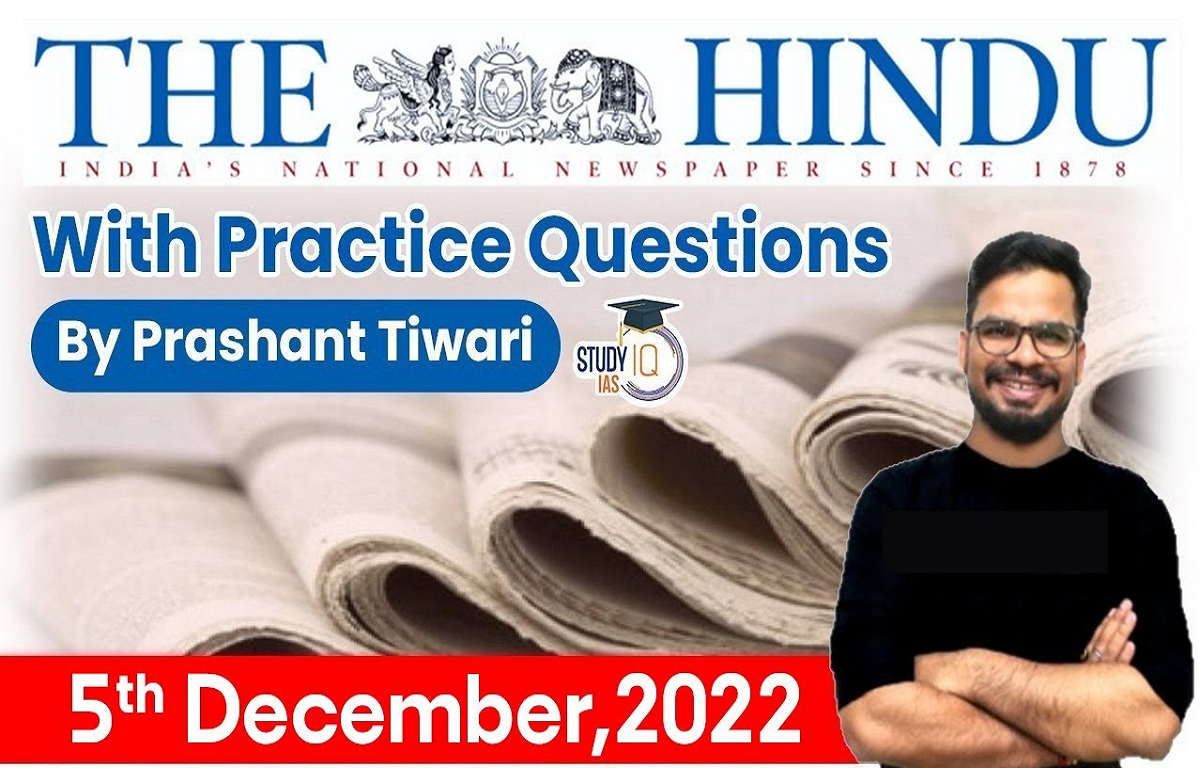
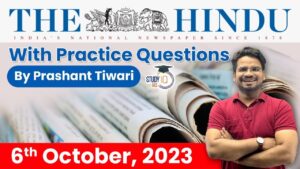 The Hindu Newspaper Analysis 6 October 2...
The Hindu Newspaper Analysis 6 October 2...
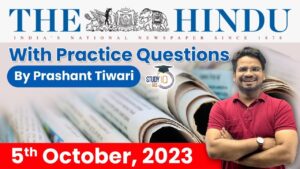 The Hindu Newspaper Analysis 5 October 2...
The Hindu Newspaper Analysis 5 October 2...
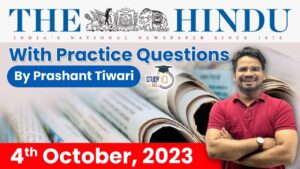 The Hindu Newspaper Analysis 4 October 2...
The Hindu Newspaper Analysis 4 October 2...

